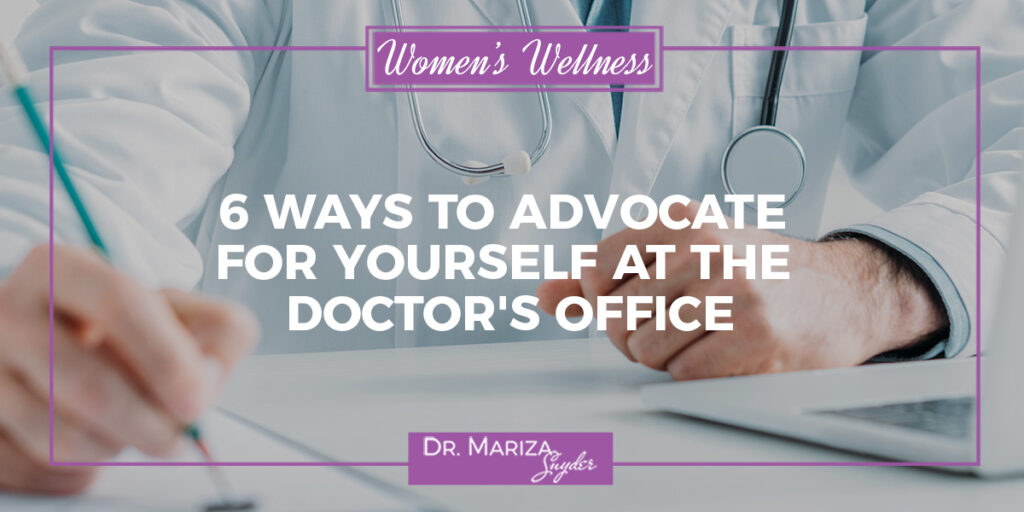
Have you ever felt misunderstood or simply not heard at all by a doctor you pursued in an effort to feel better or find healing?
Did you feel talked down to or less than simply for raising concerns or asking questions?
Have you ever been told that your Google search doesn’t trump their medical degree?
Trust-based patient-doctor relationships are the cornerstone of quality health care. Patients experience the best results when they are taken seriously and treated by a doctor they admire, respect, and who values them and their perspective. But as chronic illness has skyrocketed in recent years, the quality of care in the medical space has diminished greatly.
Still, this is no excuse for being bullied by someone in a white coat just because they have alphabet soup after their name. While this is not everyone’s experience, a growing number of people — women, especially — are experiencing medical gaslighting by their doctors, causing an overall and ominous distrust for the medical field.
What Is Gaslighting?
As described by health.com, “gaslighting” happens when a person tries to convince another to second-guess their instincts and doubt that their perception of something is real.
Medical gaslighting happens when healthcare professionals downplay or blow off symptoms you know you’re feeling and instead try to convince you they’re caused by something else — or even that you’re imagining them.
Examples of medical gaslighting include:
- Minimizing debilitating or dangerous symptoms – “Your pain can’t be that bad.“
- Blaming symptoms on mental illness – “It’s all in your head.”
- Assuming a diagnosis based on sex, race, identity, age, gender, ethnicity, or weight. – “If you lost weight, your symptoms would disappear.“
- Refusing to order important tests or imaging work. – “I know you don’t have ‘xyz’, I do not need an MRI to tell me this. I know how to do my job.“
- Refusing to discuss health issues with the patient. – “You just need to trust me.”
- Berating patients for trying to self-diagnose. – “Who’s the doctor here, me or Google?”
- Writing off the symptoms and offering a quick pill solution. – “There’s nothing you can do with your diet or lifestyle to change this; take this pill instead and get used to the side effects.”
- Being dismissive altogether – “Everything is normal. There is nothing wrong with you.”
How Being Gaslighted Propelled Me into My Own Health Journey
Over a decade ago, I got a hormone lab panel done and the results were clear: my stress and reproductive hormones were completely dysregulated. The solution I was given came in the form of two prescriptions: Birth control and Xanax.
Read More about Why Birth Control Pills Aren’t Your Best Option in Perimenopause
They felt like shut-up pills. I remember looking at those scripts, knowing they weren’t the answer. This was my sign that if I wanted to truly be well, I would need to do my own research to identify and address the root cause. Luckily, having been a biochemist for several years, I was a bulldog for research. I just knew there was a better solution, and nothing would stop me from finding it.
The Truth About Why Doctors Gaslight Patients
The act of gaslighting patients has created profound effects on the overall quality of care and on health outcomes for patients. And while gaslighting creates a trust gap between practitioner and patient, there is also a problematic knowledge gap which could be a major underlying cause behind the condescending or outright dismissive responses to patients’ concerns.
The truth is, the medical school has left a lot to be desired. Medical school can leave many issues specific only addressed generically or worse, not at all. This means doctors are not being adequately educated on serious female health issues, potential root causes, and how to help patients find healing — arguably leaving them in a position to, in an effort to conceal their own ignorance, dismiss their patients outright.
An overview of clinical research history shines a spotlight on this concept when you consider that for many decades, women were either completely excluded from or vastly underrepresented in medical research. In many ways, women’s hormones and reproductive systems were viewed not only as a complicated variable by researchers, but a liability. In fact, the FDA issued a policy in 1977 recommending the exclusion of all women of childbearing age from all clinical research, even if they were using contraception and had no intention of having children. Even aside from this policy researchers generally wanted to steer clear of women, because their complex hormonal fluctuations added unwanted complications to studies.
The book Doing Harm by Maya Dusenbery uncovers the deep, systemic problems that underlie women’s experiences of feeling dismissed by the medical system. Women have been discharged from the emergency room mid-heart attack with a prescription for anti-anxiety meds, while others with autoimmune diseases are labeled “chronic complainers” for years before being properly diagnosed. Whether women are hearing that they are “overreacting” or that their symptoms are just “psychosomatic” — in other words, caused or aggravated by a mental factor such as internal conflict or stress — the growing list of patients being gaslit by doctors is reason to sound the alarm and strive for a complete industry overhaul.
What Are the Impacts of Gaslighting Patients?
Medical gaslighting, in a nutshell, delays a diagnosis. That delay then of course delays appropriate treatment, leaving the patient in pain, or with worsening symptoms longer than necessary. It may mean that their health spirals into greater, potentially irreversible issues.
The impact of medical gaslighting also has a psychological element. It is traumatic when people don’t believe you in your pain. We go to doctors for help, care, and hopefully for some empathy and kindness in treating the issue(s) at hand. To be disrespected and discounted by the very people who are supposed to put your needs first is distressing. It leads to an erosion of trust toward the medical industry, which can prevent patients from seeking help for further health issues.
Luckily, there are ways to attend an appointment feeling informed and empowered to advocate for yourself so you can have a good experience as well as get the level of care and treatment you deserve.
You Are Your Best Advocate: 6 Ways to Advocate For Yourself
Advocating for yourself can be daunting at first. But with some self-care and best practices, you can ensure you receive only the highest caliber of treatment when you seek medical care. Here are a few tips to help:
#1 – Take a friend or family member to an appointment with you.
Having another set of eyes and ears you trust in the room with you can eliminate the potential for mistreatment. And if they have seen you suffer from symptoms firsthand, they can add some emphasis if you run into any hurdles explaining your own experience.
#2 – Bring a detailed record of your symptoms with you to your appointment.
A detailed description of what you’re experiencing and how often, as well as any relevant photographs (a rash, for example) can be helpful in “stating your case” to your doctor about what you’ve been experiencing. They can’t as easily dismiss a four-week detailed timeline of various symptoms you’ve experienced.
#3 – Equip yourself with information ahead of the appointment.
The more informed you are before you get there, the better. While you may not be a medical doctor, it is also obvious that we live in the era of smartphones and computers, which are a valuable tool we can lean on at any time.
#4 – Don’t be afraid to ask questions.
Oftentimes, patients become uncomfortable once in the exam room and stumble over their words or forget what questions they planned to ask. This is where writing down your questions and concerns beforehand and bringing them with you will be helpful.
#5 – Practice self-care and stress management ahead of your appointment.
If doctors’ offices provoke feelings of anxiety (think of a racing heartbeat, intrusive thoughts, and clammy hands), consider doing a yoga class the morning before or taking a walk outside during peak sunshine (before lunchtime). Calm & Restore is a life-changing stress management supplement that effectively combats stress, feelings of unease, and promotes a calm and balanced mind. Adaptogenic herbs like those in Adrenal Love are also integral for stress management as they regulate your stress response and lessen the burden on your adrenal glands (which, if you stay in a chronic state of stress [survival mode] are likely overworked and in need of some TLC).
#6 – If you feel uncomfortable, unheard, or gaslit, find another practitioner!
If you leave an appointment feeling like you aren’t being seen, heard, or understood – or if you just don’t feel on the same page with your doctor — the good news is, you can find another one! It’s important to remember they don’t hire you — you hire them! You pay their bills. You are their customer. This is important to remember when it comes to the quality of care you accept for yourself.
If you’ve experienced being discounted, dismissed, or gaslit by your doctor, or if your concerns have been written off as “common,” “normal,” or “something everyone experiences,” you are not alone. You may feel like there is no light at the end of the tunnel with the health conditions you suffer through day-to-day, but I’m here to tell you: you can experience true, transformative healing with or without someone in a white coat being dismissive of your experience.
Own Your Healing Journey
In my book, The Essential Oils Menopause Solution, I share up-close and personal details about my own dynamic healing journey. In it I share how I overcame health-hindering obstacles, prevailing over challenges, and how I finally won over fear and complacency, taking my health into my own hands after many “shut-up” prescriptions got me no further than I was before.
You have a purpose that is unique to you. Don’t let a doctor give you the impression that you are not capable of healing or living without symptoms that knock you down. Like me, you are capable of achieving optimal health and completely changing your life from the inside out.
Life is short – I encourage you to start today.


No comments yet.